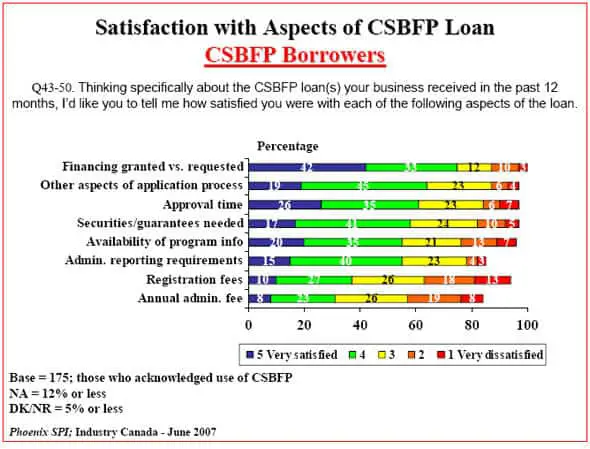With all the variety of business loans available, small businesses in Canada have an ally in the form of the Canadian Small Business Financing (CSBF) Program. The CSBF was formed in 1999 to assist Canadian small businesses with obtaining a loan for capital modernization and improvement.
Small business owners may find that financing certain capital improvements is not easy and obtaining a loan for the purpose of capital improvement requires strict approval criteria. Many lending institutions are hesitant to approve loans for smaller capital improvements, such as signage, leasehold improvements, or even technology improvements, since they offer little in the form of collateral to the bank. The CSBF, however, makes these types of loans more accessible.
Though the CSBF program was developed to help small businesses modernize and improve their equipment and other capital resources, funds are not distributed through the CSBF. Rather, small businesses must apply for a regular business loan with a bank, credit union, or caisse populaire. The program encourages these financial institutions to approve loans and make financing available to applicants by guaranteeing up to 85% of the institution’s losses if default occurs. But even with the encouragement and backing of the federal government, individual financial institutions are responsible for making loan decisions based on credit and other collateral criteria.
Amounts
Maximum loan amounts may not exceed $250,000.
Interest Rates
Interest rates are favorable to borrowers. The CSBF program determines that an interest rate may be floating or fixed. Floating rates may not be more than 3% over the lender’s prime interest rate. Fixed-rate loans may not exceed 3% more than the lender’s residential mortgage rate during the same applicable term.
Term and Repayment
Loans approved and disbursed through the CSBF program are usually no longer than the expected economic lifespan of the asset(s) being financed, and generally up to a maximum 10 years. Since loan funds are to be used specifically for the purchase of capital assets, and the assets are acting as collateral for the loan, this would make sense.
Repayment of CSBF is typically made on a month to month basis, but in special conditions, it can be repaid with a once-yearly payment. As with any loan, the payments are meant to repay the loan and interest through amortization. At the agreement of the lender, a larger balloon payment may be made at the end of the loan term in order to lower monthly payments.
Eligibility
To be eligible to apply for a loan, a business must meet certain criteria. First, the business must be operating in Canada for gain or profit. Second, it must be defined as a “small” business. For a new small business, the maximum revenues in the first 52 weeks of operation in which the CSBF loan is approved must not exceed $5 million (Canadian). For an existing business, expected revenues in which the fiscal year the CSBF loan is approved must not exceed $5 million (Canadian).
Ineligibility
Unfortunately, not all Canadian small businesses are eligible for the loan guarantee. Although the CSBF program’s goal is to smooth the way for most small businesses to obtain a loan, the following small business types are not eligible:
- Any business in the non-profit sector
- Charitable organizations
- Religious groups
- Farms, as defined in the 1980 Standard Industrial Classification of Statistics Canada
How Can the Funds Be Used?
The CSBF program was designed to help new small businesses get off the ground, as well as assist established small businesses in making improvements. Loan monies disbursed to qualified small businesses may be used for the purpose of “establishing, expanding, modernizing, and improving” small businesses. In summary, that means loan proceeds must be used in the purchase of capital improvements, such as new or used equipment, technology updates or modernization, real property, or to make leasehold improvements to leased property.
CSBF loan funds may not be used to purchase any of the following:
- Share purchase
- Franchise fees
- Vehicles for personal use
- Permits or licenses
- Building permits
- Professional fees
Financing inventory or accounts receivable
Proceeds from a CSBF may also be used to finance the registration fee, which is equal to 2% of the total loan amount. Of course, the registration fee may be financed as long as it does not exceed the $250,000 maximum amount.
Alternatives
As noted, though the criteria for approval are less restrictive with government backing, not everyone is approved for a CSBF loan. If denied, a small business owner might consider an alternative like a Merchant Cash Advance, which offers advances up to $250,000. These cash advances are made by credit card processing companies that are based on future prospective credit card processing volume, and the debt is repaid through a percentage of the business’s credit card receipts rather than regular monthly payments.
The CSBF was designed to help you, the small business owner. Consider looking into these loans to take your business to the next level of success.

